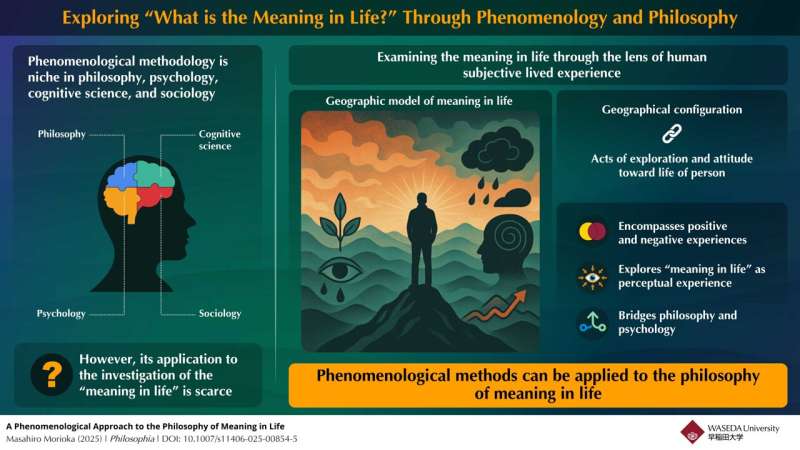Science
Waseda University Study Explores New Model of Life’s Meaning

A recent study from Waseda University introduces a new framework for understanding the concept of “meaning in life.” Conducted by Professor Masahiro Morioka and published online in the journal Philosophia on June 4, 2025, the research explores how an individual’s subjective experiences and emotional states shape their perception of life’s significance.
Psychological and philosophical research has long established that moods and emotions significantly influence how individuals perceive meaning. Philosopher Matthew Ratcliffe has noted that these emotional states operate in the background of perception, thereby affecting how people understand their lives. Morioka’s study builds on this foundation by investigating not only external perceptions but also the internal experience of meaning itself.
Introducing the Geographic Model of Meaning
Morioka’s research proposes a “Geographic Model of Meaning in Life,” which emphasizes an active exploration of personal experiences. This model suggests that the way individuals engage with their lives—through various attitudes and commitments—elicits different responses from their experiences. These responses can manifest as significant or distressing life events, highlighting that the value of life is shaped by a complex interplay of experiences.
The study asserts that the understanding of “meaning in life” should be viewed as a geographical configuration, reflecting the individual’s actions and attitudes towards life. Morioka describes this model as “the whole set of patterns of combinations of lived experiences of the worthfulness of living a life that are activated by my action of probing into my life in the here and now.” He likens this probing to the way a blind person navigates their environment with a cane, emphasizing that individuals explore their lives with various attitudes—positive, negative, or reluctant.
A Paradigm Shift in Understanding Meaning
This research marks a significant shift in how both meaningful and tragic experiences are conceptualized within the same experiential landscape. By integrating phenomenological methodology into the philosophy of life’s meaning, Morioka’s work opens avenues for interdisciplinary collaboration between philosophy and psychology.
Existing psychological frameworks for measuring life meaning typically employ both quantitative and qualitative scales. However, Morioka’s geographic model offers a fresh perspective, potentially providing new insights into human experiences of meaning.
Looking ahead, Morioka aims to integrate his findings with other philosophical approaches to life’s meaning, including solipsistic and liberation-recollection frameworks. He states, “Through such integration, I aim to build a new, systematic framework within the philosophy of life’s meaning.”
The implications of this study extend beyond academic inquiry, inviting individuals to reflect on how their engagement with life shapes their understanding of its significance. As the discourse around life’s meaning continues to evolve, Morioka’s innovative approach may inspire further research and discussion in both psychology and philosophy.
-

 Science1 month ago
Science1 month agoNostradamus’ 2026 Predictions: Star Death and Dark Events Loom
-

 Technology2 months ago
Technology2 months agoOpenAI to Implement Age Verification for ChatGPT by December 2025
-

 Technology7 months ago
Technology7 months agoDiscover the Top 10 Calorie Counting Apps of 2025
-

 Health5 months ago
Health5 months agoBella Hadid Shares Health Update After Treatment for Lyme Disease
-

 Health5 months ago
Health5 months agoAnalysts Project Stronger Growth for Apple’s iPhone 17 Lineup
-

 Technology5 months ago
Technology5 months agoElectric Moto Influencer Surronster Arrested in Tijuana
-

 Education5 months ago
Education5 months agoHarvard Secures Court Victory Over Federal Funding Cuts
-

 Health5 months ago
Health5 months agoErin Bates Shares Recovery Update Following Sepsis Complications
-

 Technology7 months ago
Technology7 months agoMeta Initiates $60B AI Data Center Expansion, Starting in Ohio
-

 Technology6 months ago
Technology6 months agoDiscover How to Reverse Image Search Using ChatGPT Effortlessly
-

 Science4 months ago
Science4 months agoStarship V3 Set for 2026 Launch After Successful Final Test of Version 2
-

 Technology7 months ago
Technology7 months agoRecovering a Suspended TikTok Account: A Step-by-Step Guide









